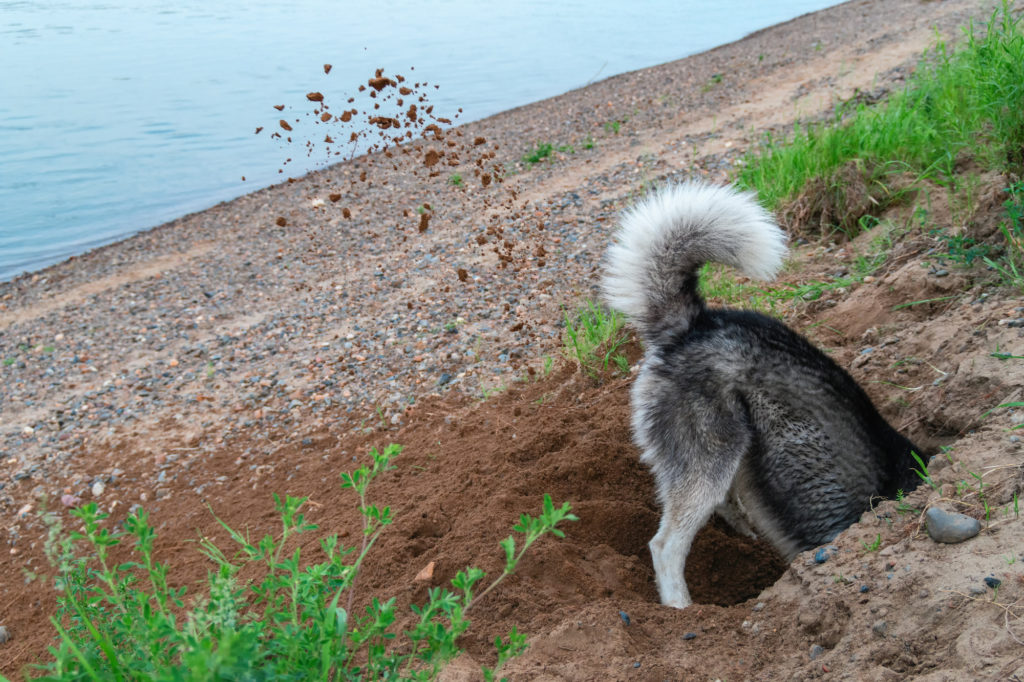Huskies are renowned for being escape artists and often find ways to dash away from home. It can be a very stressful experience for owners who just want to keep their dogs at home and safe!
Why do huskies run away? Read on to learn more.
Why Do Huskies Run Away?
Huskies may run away for a variety of different reasons. These reasons are usually related to unmet physical or mental enrichment needs. It can also be due to the high curiosity that these dogs have, which pushes them to explore and investigate everything they see.
8 Common Reasons Why Huskies Run Away
1. They See Something Interesting
Huskies are immensely curious dogs, often becoming interested in even the smallest of potential distractions.
A husky who spots, smells, or hears something interesting may feel the intense desire to go chasing after it to see what it’s all about.
A determined husky will find any means to escape its boundaries to seek out the interesting feature that has caught its senses!
2. They’re Natural Runners
Huskies were originally bred as sled dogs, designed to be able to traverse long distances in very cold environments and harsh weather conditions.
This means that they’re naturally athletic, and with that athleticism comes a lot of energy that is contained inside their bodies!
When a husky doesn’t feel sufficiently entertained or has a lot of energy to burn, it may want to escape its fenced area to run wild and free.
As a runner, a husky’s escape isn’t just to explore but to really stretch its muscles, inadvertently bringing the dog far away at a very quick pace.
Huskies are capable of running a whopping hundred miles per day, so running away for a short distance feels like nothing to them!
3. Their Prey Drive Compels Them
Like many dogs, huskies have a strong prey drive born from years of active hunting out in the wild. Animals like cats, squirrels, birds, raccoons, and even insects can trigger a husky’s desire to chase after prey.
Spotting a small, quick-moving animal is enough to drive a husky wild. If it sees this creature escape out of its fence or run outside, a husky may feel compelled to do anything in its power to chase it.
4. They Want To Mate
Most unneutered huskies – and any breed, really will feel the desire to leave their immediate environment to seek out a mate during specific seasons of the year.
This is especially prevalent among male dogs but can affect any dog regardless.
5. They’re Bored
As a highly intelligent and independent breed, huskies require quite a bit of physical and mental stimulation to feel rested. Without that, they can quickly become bored and restless, which can cause them to want to seek excitement in other places.
This alone can be sufficient to compel a husky to break free from its home and explore to seek out something to occupy it physically and mentally.
6. They’re Lonely
Despite being independent, huskies crave attention and affection from their owners.
If you’ve had to give your dog less attention than usual, it might become lonely, which feeds into the same boredom that compels it to escape and seek fulfillment in other places.
7. They Get Scared
Domesticated dogs have a higher risk of being afraid of various sudden or unusual sounds, sights, and smells. A husky is no exception.
In response to its fear, a husky may use its energy and intelligence to quickly escape and run away from the source of the problem.
8. They’re Trying To Find An Old Home
Huskies, especially adult huskies, can have trouble adjusting to new environments.
If you have adopted or purchased an adult husky, it may want to go back to its original home and may feel stressed out in its new environment. This is why bringing adult huskies into your life can be such a big challenge.
Why Are Huskies Known To Be Escape Artists?
Huskies are known to be escape artists because of their fiercely determined, independent personalities, good intelligence, and high athleticism.
These things combined allow huskies to overcome the typical mental and physical hurdles that may prevent other dogs from escaping.

They’re good at jumping fences, breaking through weaknesses in enclosures, and just trying something again and again until it works. They’re also smart enough to detect any intelligent ways to escape a scenario and solve problems.
How To Train/Prevent A Husky From Running Away
1. Anti-Escape Training
It is possible to train a husky to resist the call of an open door, but it takes careful, gradual practice and a lot of patience and caution.
To do this, put a leash on your dog and get a few high-value treats. Position your husky in front of the main door. Have someone hold the leash, hold the leash yourself, or safely tie it somewhere.
Now, place your hand on the front door while commanding your husky to stay. If it stays, give it a treat and praise it. Next, turn the doorknob while commanding stay, rewarding for successful staying.
Once this is done, open the door very slightly while commanding stay, then closing it and rewarding correct staying.
In this manner, you will gradually increase the amount that the door opens and how long you leave it open.
Once your husky is good at that, open the door a little and walk away before going back to close the door, once again increasing the duration once your husky is good at staying for each phase.
After this, you can add extra difficulty. Open the door, command your dog to stay, and throw a toy outside while reminding your dog to stay. Reward successes and keep training sessions short but frequent.
Don’t stop practicing, even after your dog gets very good at this, and add difficulty and challenge as is reasonable.
Remember that the goal of this training is not to give you the chance to leave doors open all the time.
Instead, it is to ensure that, in the event of human error that leaves a door or similar exit open, your husky will be less inclined to run out or will be able to listen to commands to stay.
2. Off-Leash Training
Train your husky to heel and follow basic commands in your fenced-in backyard without a leash on.
Your husky should be able to reliably follow you and come to you when called over prolonged periods of time until you feel confident that your dog will stay by your side without a leash reliably.
Remember that the goal of off-leash training isn’t for them to go without a leash all the time.
It is to prepare yourself and your dog for the possibility that it finds itself outside without a leash so that your dog doesn’t overreact and can be trusted to come to you without it.
3. Regular Exercise
A lot of what drives huskies to run away comes from their high energy levels. Regular exercise that meets your husky’s needs will help to keep those tendencies in check.
When your husky is tired from a day of good exercise, it won’t be as inclined to break through a fence in pursuit of a squirrel or wiggle free through a loose fence to go exploring and running.
A tired dog is a happy dog, and a happy dog is less interested in misbehavior.
4. Sufficient Stimulation and Entertainment
Just like with exercise, huskies need entertainment to keep them occupied throughout the day. A lack of stimulation is part of what compels many huskies to escape in search of entertainment and enrichment.
Providing a husky with enough toys and attention throughout the day is crucial.
Puzzle-related toys can also help to keep them engaged. Rotating toys is also recommended to keep things fresh and interesting.
Don’t forget the importance of attention and affection, either. A husky hates feeling neglected and may be more inclined to escape if its affection needs are unmet!
5. Precautionary Measures
No amount of training alone can absolutely guarantee that a husky will not run away.
That’s why precautionary measures must be taken to keep them safe. Your husky’s home must be “husky-proofed” to prevent escape shenanigans.
Install baby gates indoors and high and deep fences outdoors. Keep windows and doors closed at all times and use locks and chains to secure them if necessary.
When walking outdoors, ensure the use of a well-fitted harness or leash to maintain control over your husky’s movement.
How To Catch/Find A Husky That Has Run Away
Catching and finding a husky that has run away follows similar steps to finding a dog of any breed that has run away.
Start by visiting local animal services to inform them of your lost dog. Most services will provide you with sufficient information on what steps to take to coax the dog home.
A common method used to encourage dogs to return home is leaving out familiar items for them in places where they have been sighted.
Crates, beds, toys, blankets, and bedding that smell like home, as well as personal items that smell like you, can be traced by a dog’s strong nose.
Can A Husky Find Their Way Home After Escaping?
Huskies are known for their high intelligence and a strong sense of direction. It’s why so many huskies confidently escape their new homes in search of their old ones.
They have a rather impressive memory and can often find their way back home, even after being gone for a while.
However, it’s worth noting that this is not always the case. Huskies, like any dog, can become disoriented or confused, or may get lost in new environments.
Huskies may also run too quickly when they first escape due to their instincts or stress-related factors, so they may get too far away before realizing that they no longer recognize their environment. In this case, they may not be able to find their way home.
Huskies may also not always want to come home, especially if this is a newly purchased or adopted dog. Huskies who feel unhappy are unlikely to try and make their way home, even if it’s only because they’re having trouble adapting to a new place.
If your husky escapes, it’s unwise to rely on it to simply find its way home, and it’s unwise not to ensure that your husky has the appropriate identification information attached to it in a collar or chip.
Conclusion
Huskies run away for many different potential reasons, and their personalities, athleticism, and intelligence makes them very good escape artists.
With careful training and precautions, you can reduce the risk of an escape incident from this spirited breed!

